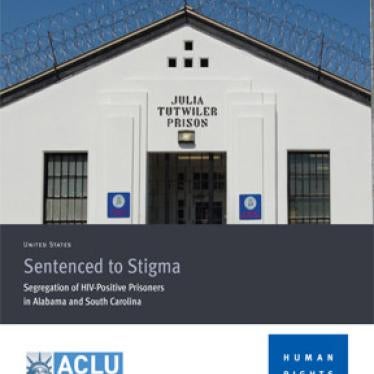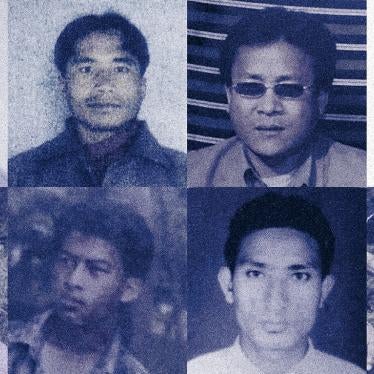"I recommend that some of these human rights people be locked up for a month with inmates in the HIV ward. When the human rights activists get raped and given HIV, then I want them to re-write their recommendation."
This was a typical comment that ran under an online story on April 14 in the Montgomery, Alabama Advertiser announcing the release of "Sentenced to Stigma," a joint report by Human Rights Watch and the ACLU National Prison Project. The subject of the report was the segregation of HIV-positive prisoners in Alabama and South Carolina, the only two states in the union that still separate prisoners with HIV from the general population.
The report detailed the suffering caused by this archaic policy, which broadcasts people's HIV status to the rest of the prison population and to family, friends and the community as well. The policy also results in discrimination in access to programs, in-prison jobs and re-entry opportunities that help other prisoners make a successful transition back to society. The report points out that these policies are based on prejudice rather than science and recommends that Alabama and South Carolina join the other 48 states and the federal Bureau of Prisons in mainstreaming HIV-positive prisoners with the general prison population.
The response of the local press to the report's release was largely positive. We were invited to meet with the editorial boards of the Birmingham News and the Montgomery Advertiser, and the Birmingham News wrote an editorial calling for a change in the segregation policy. We received more TV coverage from network affiliates than we had expected. But the comments appearing under each of the online articles in the regional press were overwhelmingly hostile to the rights of people living with HIV and to prisoners. This should not have been too surprising, given the stigma in this society that surrounds both HIV and incarceration. What was very disturbing, however, was the number of comments, such as the one quoted above, that conjured an image of prisoners with HIV as predators.
Rape in prison is a serious issue. Human Rights Watch research and advocacy addressing rape in prison is extensive, ranging from documentation of sexual abuse in prisons ("No Escape", Human Rights Watch 2007) to participation on the Prison Rape Elimination Commission. The reality, however, is that there is no evidence that sexual predators in prison are more likely to be HIV-positive than not.
As we stated in the report, decisions about housing and programs for all prisoners should be made according to the criteria set out in the state classification systems-criminal history, behavior in prison and other factors-rather than solely on the basis of their HIV status. That way, prisoners who have demonstrated predatory behavior would be placed apart from the general inmate population regardless of their HIV status. Segregating all HIV-positive prisoners promotes a damaging myth of the HIV-positive prisoner as inherently menacing and dangerous.
Other discriminatory policies in prison also contribute to stigma and misinformation about HIV. In Alabama and South Carolina, prisoners living with HIV are barred from working in the kitchen and other food service areas. Prison officials don't even pretend that this policy is based on science, as the federal Centers for Disease Control and Prevention have clearly stated that there is no medical basis for excluding HIV-positive people from food service employment.
Rather, Alabama officials cited a "survey" indicating that 80 percent of those prisoners asked supported barring inmates with HIV from working in the kitchen. A deputy commissioner of the Alabama prison system explained to Human Rights Watch and the ACLU that HIV-positive prisoners are barred from all kitchen work because "inmates don't want homosexuals handling their food."
This statement was shocking in more ways than one. In 25 years of prison rights advocacy, we have never seen a correctional policy based on a "survey" taken of the inmate population. One could only imagine the results of surveys that asked whether certain racial or religious groups should be barred from full participation in prison life. South Carolina, too, justifies its policy by citing hostility to the idea among prisoners in the general population. Behind this outright rejection of science -- and abandonment of standard correctional practice-lies nothing more than an ugly prejudice against both people with HIV and homosexuals. Unfortunately, instead of challenging these misinformed opinions with education, prison officials have chosen to indulge, and indeed promote, this prejudice.
When state officials contribute to false information about HIV, both human rights and the public health suffer the consequences. According to the Center for HIV Law and Policy, at least 50 people have been prosecuted in the US for HIV-related crimes since 2008. The majority of prosecutions sought to punish consensual acts in which a person's HIV status was not fully disclosed. In many of these cases, transmission did not occur, and was not even required for prosecution under the statute. Several of the cases involve spitting, a behavior that bears no relation to HIV transmission.
These criminal prosecutions, often under statutes that punish conduct that carries no risk of HIV exposure, exacerbates myths, fears and hostilities against people living with HIV. These government policies threaten public health by driving people with HIV away from testing, care and services.
Yet the media frenzy surrounding these cases creates a lasting imprint in the mind of the public that demonizes HIV itself along with the accused. To quote Justice Edwin Cameron, "HIV is a virus, not a crime." But the crucial distinction is all too easily lost. As we saw this month in Alabama, state policies that advance distortions of the truth can be used to justify discrimination against people with HIV, including a state prison's outdated, unnecessary policy of segregation.







